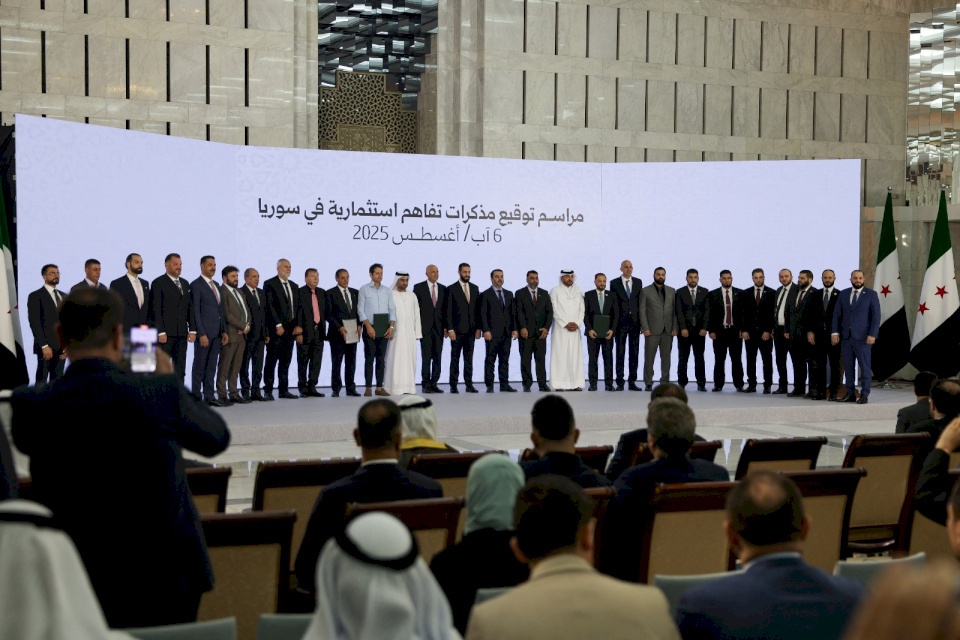
Syria Reveals Investment Projects Worth 14 Billion Dollars
SadaNews - Syria has announced one of its largest investment plans in decades, revealing projects exceeding 14 billion dollars in vital sectors including transport and urban development, indicating a clear signal of the start of a new phase of reconstruction after more than a decade of war.
The announcement was made during an official ceremony at the People's Palace in Damascus, attended by Syrian President Ahmad al-Shara, and the U.S. envoy to Syria Thomas Barak, where the head of the Syrian Investment Authority Talal al-Halabi unveiled 12 strategic projects, topped by the development of Damascus International Airport with investments amounting to 4 billion dollars (between the Syrian Civil Aviation Authority and Qatar's UCC Holding); and the establishment of a subway in the capital with a cost of 2 billion dollars (in cooperation with the UAE National Investment Company), in a step aimed at enhancing urban infrastructure and facilitating transportation and tourism.
The investment package also included massive real estate and commercial projects, such as the "Damascus Towers City" consisting of 60 towers valued at 2.5 billion dollars (in cooperation with the Italian company Yobaco), and the "Baramka Towers" totaling approximately 500 million dollars, along with a large shopping center named "Baramka Mall" at a cost of 60 million dollars.
Al-Halabi stated that these investments "will represent a qualitative shift in infrastructure and economic life, and will be distributed in strategic locations across Syria."
Syrian President Ahmad al-Shara is flanked by representatives of the entities signing investment memoranda in Syria during a ceremony held on August 6, 2025.
Gulf Investment Momentum
The Syrian announcement comes amid the rising Gulf investment momentum in the country. Last July, Saudi Arabia signed 47 agreements with the Syrian government worth 6.4 billion dollars during the "Syrian-Saudi Investment Forum 2025" hosted in Damascus.
These agreements cover 11 key sectors, including housing, tourism, industry, energy, communications, and aviation. Saudi Investment Minister Khalid al-Falih confirmed that over 500 Saudi companies have expressed interest in entering the Syrian market, while Crown Prince Mohammed bin Salman issued a directive to form a Saudi-Syrian Business Council chaired by Mohammed Abdullah Abu Nayan, Chairman of Aqua Power, to enhance institutional cooperation frameworks between the two countries.
Qatar Steps In
Meanwhile, the Qatari company "Baladna" announced in early July its investment of 250 million dollars in a project to produce milk and juices within Syria, signaling a gradual return of Qatari capital to the Syrian market, revealing the untapped potential in the agricultural sector and food industries to support food security and provide job opportunities.
UAE Expands in Ports
In May, the General Authority for Marine and Land Ports in Syria signed a memorandum of understanding with "DP World" worth 800 million dollars to develop and operate a multi-purpose container terminal at the Port of Tartus.
The agreement also includes cooperation in establishing industrial and free zones, dry ports, and logistic hubs along strategic routes within the country, indicating the UAE's efforts to solidify its logistical and commercial presence in the Eastern Mediterranean.
European Attraction
The momentum has not been limited to the Gulf. The French company CMA CGM - the world's third-largest shipping company - announced an investment of 230 million euros to develop and operate the Port of Latakia, under an agreement signed with the Syrian Ports Authority, a move that opens the door for a gradual return of European capital to Syria.
The Broader Scene: The Reconstruction Battle Begins
This influx of investments comes amid estimates indicating that Syria needs more than 800 billion dollars to rebuild what was destroyed by the war. With the lifting of some sanctions and increasing regional openness, it seems that the "reconstruction battle" has officially begun, with the Gulf emerging as a key driver for the next phase, as Damascus seeks to reposition itself economically and strategically in the region.

Barclays: Oil Prices Could Reach $80 per Barrel

Bitcoin Falls Near $63,000 Following Attack on Iran

The Trap of High Prices: Debts Haunt Germans and Bankruptcy Knocks at Their Doors

Major Changes in the Saudi Public Investment Fund… What is Happening?

Gold Stabilizes and Heads for its Seventh Consecutive Monthly Gain

The IMF Disburses Approximately $2.3 Billion to Egypt Following Two Reviews of the "Reform...

Oil Rises Amid Expectations for Nuclear Negotiations Between Washington and Tehran
